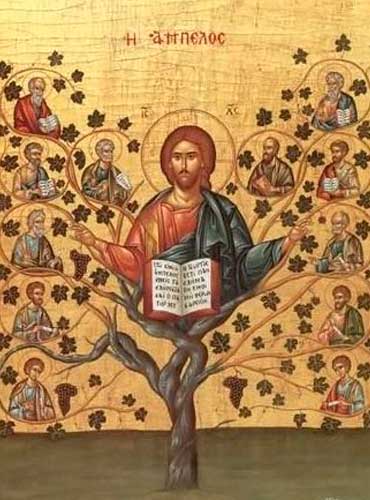Wednesday of the Fifth Week of Easter – Option 1 – Jn 15:1-8
In today’s Gospel Jesus uses the beautiful image of the true vine and His Heavenly Father as the vinedresser. We can examine that image, and consider three elements: first, the relationship the vinedresser has to the vine, second, the vinedresser’s actions, and, lastly, what it means for us, namely, that we must remain in Christ.
First, it helps to consider what sort of relationship the vinedresser had to his vines. Unlike other crops that are simply planted, cared for, and harvested all in one season, vines last for years, so it’s not an exaggeration to say that a vinedresser would know his vines individually or personally, just as a shepherd knows his sheep. Furthermore, vines require great care and constant attention: they grow very fast, but in order to have them produce the most and the best fruit, the ground beneath them needs to be perfectly clean, and they must be constantly checked and trimmed. Even when mature, the vine is pruned twice a year in such a way that it is greatly reduced.[1] All of this, though, is done under the watchful eye and tender hand of a vinedresser who knows his vines very well, and knows exactly what he is doing.
This leads to our second point: Jesus makes reference to two actions of the vinedresser. First, he cuts away the dead branches, so they don’t spread disease or suck away the life of the vine, just as Christ prunes away our sins and failing. However, the vinedresser will also cut away living parts if these lower not just the quantity, but also the quality of the fruit. Sometimes the vines have so many fruitful branches that some are cut to make sure the remaining ones get the nutrients they need; otherwise, the grapes will be sour. Note that Christ says that the Father prunes each and every vine that produces fruit: the Greek pan to karpon (πᾶν τὸ καρπὸν) emphasizes this. No fruit bearing branch is exempt. The Father’s reason for doing so is out of love, even though the process is painful.[2] Indeed, the process is so delicate and so important that sometimes vineyard owners would spend two or three years just training the pruners how, when, and where to cut.[3] The process hurts the vine, to be sure, but, under the hand of the master, the result is something much better than anticipated. In our lives, too, God works with His grace not only to remove our sins and faults, the dead branches, but also to take away those things that, while not necessarily sinful, prevent us from producing the fruit that He desires.
This is why Christ tells us to remain in Him, our third point. In fact, in the eight verses of the Gospel, He uses the verb remain eight times. Aquinas says that we remain in Christ by believing, obeying, and persevering, and that Christ remains in us by giving enlightenment, help, and perseverance.[4] Clearly, this means we have to live supernatural lives, since “without Him, we can do nothing”: the Greek is very powerful, and the word means that absolutely every possible example, absolutely anything you can think of that you could do on your own, you can’t. It is a categorical statement: you can’t do some things, or even a few things very poorly. You can do nothing. Period.[5] The only way we can see things properly and do anything at all is by staying close to God.
Let us pray, through the intercession of Mary, the Handmaid of the Lord, for the grace to do precisely that: to remain in God by letting Him prune us and so bear the fruit that He desires.
[1] Cf. William Barclay, Daily Study Bible, Jn 15:1-10, con’t: The Vine and The Branches.
[2] Cf. D. A. Carson, The Gospel According to John (Grand Rapids: Eerdmans, 2001), 514.
[3] Cf. Warren W. Wiersbe, The Bible Exposition Commentary: New Testament, 356.
[4] Cf. Aquinas, Commentary on the Gospel of Saint John, 1992: “Quod non solum necessaria est hominis mansio in me ut fructificet, sed etiam est efficax; quia qui manet in me, credendo, obediendo, perseverando, et ego in eo, illuminando, subveniendo, perseverantiam dando, hic, et non alius, fert fructum multum.”
[5] HELPS Word-studies: 3762 oudeís (from 3756 /ou “no, not” and 1520 /heís, “one”) – properly, not one; no one, nothing.
3762 /oudeís (“no one, nothing at all”) is a powerful negating conjunction. It rules out by definition, i.e. “shuts the door” objectively and leaves no exceptions. 3762 (oudeís) is deductive in force so it excludes every (any) example that is included within the premise (supposition).






